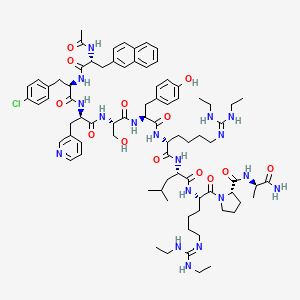Buy Ganirelix Online
Ganirelix, a GnRH antagonist, is used in assisted reproduction to block premature ovulation, ensuring the retrieval of mature eggs for procedures like in vitro fertilization.
Ganirelix, a GnRH antagonist, is used in assisted reproduction to block premature ovulation, ensuring the retrieval of mature eggs for procedures like in vitro fertilization.
SHARE:
Products sold on our website are designed for in vitro testing and lab experimentation exclusively.
All the products you see on the website are being sold in a lyophilized powder state (freeze-dried), in a sealed sterile vial; and should be reconstituted.
The product’s label clearly states the amount of product a vial contains; some products are offered in different variations.
The products we are selling come in a sealed vial but require additional lab equipment for proper testing.
Ganirelix is a medication used in fertility treatments. It belongs to a group of drugs called gonadotropin-releasing hormone (GnRH) antagonists. Ganirelix works by preventing the release of luteinizing hormone (LH), which helps regulate the menstrual cycle. By inhibiting LH, Ganirelix can help prevent premature ovulation during assisted reproductive technologies such as in vitro fertilization (IVF). It is typically administered as an injection under the skin.

Source: PubChem
Ganirelix is commonly used in conjunction with in vitro fertilization (IVF) treatments to prevent premature ovulation. It is administered as a subcutaneous injection and helps regulate hormones to prevent luteinizing hormone (LH) surges, which can interfere with the success of IVF procedures.
During IVF treatment, medications such as follicle-stimulating hormone (FSH) are administered to stimulate the production of multiple eggs. Ganirelix is typically introduced around the sixth day of FSH administration to prevent premature ovulation and help with controlled ovarian stimulation.
It is important to note that the specific usage of Ganirelix in IVF varies depending on individual circumstances, and it should only be used under the guidance and prescription of a healthcare professional.
Ganirelix offers several benefits in the context of fertility treatments and assisted reproductive technologies.
Prevention of Premature Ovulation: Ganirelix helps prevent premature ovulation by inhibiting luteinizing hormone (LH) surges. This is crucial during fertility treatments, such as in vitro fertilization (IVF), where the timing of ovulation is carefully controlled to optimize the chances of successful fertilization and implantation.
Enhanced Control over Ovarian Stimulation: By blocking LH surges, Ganirelix helps maintain better control over the stimulation of multiple follicles in the ovaries. This allows fertility specialists to have more precise control over the timing of egg retrieval during IVF cycles.
Improved Treatment Success Rates: Ganirelix in assisted reproductive technologies, like IVF, can enhance the success rates of these procedures. Preventing premature ovulation increases the likelihood of a higher number of mature eggs being available for fertilization, leading to improved chances of successful embryo development and implantation.
Reduced Risk of Cycle Cancellation: Premature ovulation can lead to the cancellation of an IVF cycle if eggs are lost before they can be retrieved. Ganirelix is crucial in minimizing this risk by suppressing LH surges and preserving the eggs for retrieval.
Patient Convenience: Ganirelix is administered as a subcutaneous injection, typically once daily. Its ease of use and convenience make it a preferred choice for patients undergoing fertility treatments.
While Ganirelix is primarily used in fertility treatments, its usage in other medical conditions is limited. However, there have been studies and reports on the potential use of Ganirelix in treating certain non-fertility-related conditions. It's important to note that these uses are still being studied and may not be widely accepted or approved.
Endometriosis: Some studies have explored the use of Ganirelix in the treatment of endometriosis, a condition where tissue similar to the lining of the uterus grows outside the uterus. Ganirelix may help suppress the growth of endometrial tissue and alleviate symptoms associated with endometriosis.
Polycystic Ovary Syndrome (PCOS): PCOS is a hormonal disorder affecting women of reproductive age. While not a primary treatment, Ganirelix has been investigated as a potential option to regulate hormone levels and improve ovulation in women with PCOS.
Ganirelix, like any medication, may have potential side effects. It's important to note that not everyone will experience these side effects, and some individuals may experience different reactions. Here are some potential side effects associated with this drug:
Less common side effects:
Common side effects:
Sources:
https://www.webmd.com/drugs/2/drug-75166/ganirelix-subcutaneous/details
https://my.clevelandclinic.org/health/drugs/20358-ganirelix-injection
https://www.ncbi.nlm.nih.gov/pmc/articles/PMC10201301/
https://www.sciencedirect.com/science/article/pii/S0015028210008125
Useful links